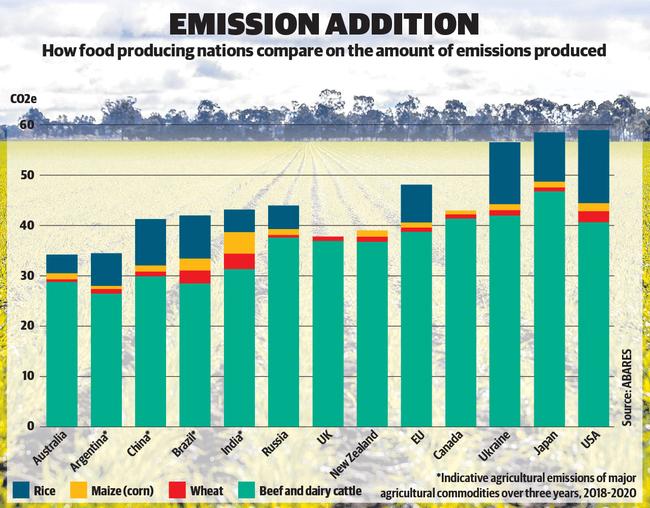New research shows Australian farms rate as the least intensive producers of emissions
A comparison of average greenhouse gases produced per tonne of grain and per head of cattle has found Australian farms are among the lowest emitters.
Australian farms produce the least amount of emissions per commodity unit compared to other major food producing nations, a recent study by ABARES reveals.
The statistical analysis compares the average, predicted on-farm emissions intensity for major commodities – cattle, wheat, maize and rice – from 13 countries.
ABARES crunched figures comparing the average greenhouse gases produced on a per tonne of grain produced and per head of cattle basis.
According to the bureau, this measure was a “useful means to compare the environmental impact of the same activities across different countries”.
“Countries with a lower emissions intensity produce less emissions for the same level of activity than countries with a higher emissions intensity,” it reported.
The detail of the data shows on a per animal basis, Australian production systems rank as the third lowest estimated producer of emissions per head of cattle, or third best in the world, being narrowly beaten by Argentina and Brazil on five year averages.
Grains emissions from Australian farms were estimated to be the lowest of all countries on the five year averages calculated by ABARES.

The analysis was evidence Australian agriculture should be “celebrated” for its efficient practices and comparatively low emissions per unit of food, and not “made the scapegoat on climate, for the benefit of other industries”, according to a farm leader.
National Farmers’ Federation president David Jochinke said the efficiency and sustainability of Australian agriculture was not properly appreciated in the national conversations on climate and agriculture’s footprint.
“There is a lot of opinions put out there, without a lot of evidence,” Mr Jochinke said.
“This data shows Australia is very efficient and sustainable in how we run our farms … we can’t afford to be inefficient.”
He said policies that impacted agriculture should not harm farmers’ ability to continue lifting productivity, and not weigh down their efficiency.
“Arbitrary policies that detract from the main game of producing food in a sustainable and profitable way would see the system unravel,” he said.
This comes as one of the leading academics in the climate and agriculture space, University of Melbourne’s Professor Richard Eckard, has warned against “perverse outcomes” of using farmland to offset emissions from other sectors of the economy, such as mining.
He told a recent forum Australia may regret carbon credits for soil carbon and trees. Prof Eckhard said biodiversity offsets, opposed to carbon credits, may come in to play more in future.
Mr Jochinke agreed and said “farmland should not be taken out of production for offsets (the benefit other industries)”.
He said Australia must continue to focus on productivity and not allow “ideology” to lead to a reduction in Australia’s farm production, to be taken up by other producers. “We need to celebrate our high value, high quality production,” he said.





